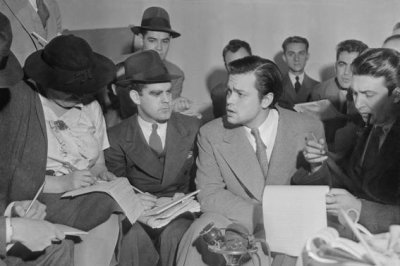Topic: Ezra Pound
Ezra Weston Loomis Pound (30 October 1885 – 1 November 1972) was an American expatriate poet and critic, and a major figure in the early modernist movement in poetry. He became known for his role in developing Imagism, which in reaction to the Victorian and Georgian poets favored tight language, unadorned imagery, and a strong correspondence between the verbal and musical qualities of the verse and the mood it expressed. His best-known works include Ripostes (1912), Hugh Selwyn Mauberley (1920), and his unfinished 120-section epic, The Cantos, which consumed his middle and late career, and was published between 1917 and 1969.
Working in London in the early 20th century as foreign editor of several American literary magazines, Pound helped to discover and shape the work of contemporaries such as T.S. Eliot, James Joyce, Robert Frost, and Ernest Hemingway. It was Pound who was responsible for the publication in 1915 of Eliot's The Love Song of J. Alfred Prufrock, and for the serialization from 1918 of Joyce's Ulysses. Hemingway wrote in 1925: "He defends when they are attacked, he gets them into magazines and out of jail. He loans them money. ... He writes articles about them. He introduces them to wealthy women. He gets publishers to take their books. He sits up all night with them when they claim to be dying ... he advances them hospital expenses and dissuades them from suicide."
Outraged by the loss of life during the First World War, he lost faith in England, blaming usury and international capitalism for the war. He moved to Italy in 1924 where throughout the 1930s and 1940s, to his friends' dismay, he embraced Benito Mussolini's fascism, expressed support for Adolf Hitler, and wrote for publications owned by the British fascist Oswald Mosley. The Italian government paid him during the Second World War to make hundreds of radio broadcasts criticizing the United States, Franklin D. Roosevelt, and in particular Jews, broadcasts that were monitored by the U.S. government, as a result of which he was arrested for treason by American forces in Italy in 1945. He spent months in detention in a U.S. military camp in Pisa, including 25 days in a six-by-six-foot outdoor steel cage that he said triggered a mental breakdown: "when the raft broke and the waters went over me." Deemed unfit to stand trial, a decision disputed for decades after his death, he was incarcerated in St. Elizabeths psychiatric hospital in Washington, D.C., for over 12 years.
It uses material from the Wikipedia article "Ezra Pound."







